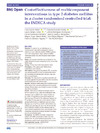Please use this identifier to cite or link to this item:
https://accedacris.ulpgc.es/jspui/handle/10553/114516
| Title: | Cost-effectiveness of multicomponent interventions in type 2 diabetes mellitus in a cluster randomised controlled trial: the INDICA study | Authors: | García-Pérez, Lidia Ramallo Fariña, Yolanda Vallejo Torres, Laura Rodríguez Rodríguez, Leticia González Pacheco, Himar Santos Hernández, Beatriz García Bello, Miguel Angel Wägner, Anna Maria Claudia Carmona, Montserrat Serrano Aguilar, Pedro G. |
UNESCO Clasification: | 531207 Sanidad | Keywords: | Diabetes and endocrinology Health economics Health informatics Primary care Quality in health care |
Issue Date: | 2022 | Project: | ADE10/00032 PI16/00769 |
Journal: | BMJ Open | Abstract: | OBJECTIVE: To analyse the cost-effectiveness of multicomponent interventions designed to improve outcomes in type 2 diabetes mellitus (T2DM) in primary care in the Canary Islands, Spain, within the INDICA randomised clinical trial, from the public health system perspective. DESIGN: An economic evaluation was conducted for the within-trial period (2 years) comparing the four arms of the INDICA study. SETTING: Primary care in the Canary Islands, Spain. PARTICIPANTS: 2334 patients with T2DM without complications were included. INTERVENTIONS: Interventions for patients (PTI), for primary care professionals (PFI), for both (combined intervention arm for patients and professionals, CBI) and usual care (UC) as a control group. OUTCOMES: The main outcome was the incremental cost per quality-adjusted life-years (QALY). Only the intervention and the healthcare costs were included. ANALYSIS: Multilevel models were used to estimate results, and to measure the size and significance of incremental changes. Missed values were treated by means of multiple imputations procedure. RESULTS: There were no differences between arms in terms of costs (p=0.093), while some differences were observed in terms of QALYs after 2 years of follow-up (p=0.028). PFI and CBI arms were dominated by the other two arms, PTI and UC. The differences between the PTI and the UC arms were very small in terms of QALYs, but significant in terms of healthcare costs (p=0.045). The total cost of the PTI arm (€2571, 95% CI €2317 to €2826) was lower than the cost in the UC arm (€2750, 95% CI €2506 to €2995), but this difference did not reach statistical significance. Base case estimates of the incremental cost per QALY indicate that the PTI strategy was the cost-effective option. CONCLUSIONS: The INDICA intervention designed for patients with T2DM and families is likely to be cost-effective from the public healthcare perspective. A cost-effectiveness model should explore this in the long term. TRIAL REGISTRATION NUMBER: NCT01657227. | URI: | https://accedacris.ulpgc.es/handle/10553/114516 | ISSN: | 2044-6055 | DOI: | 10.1136/bmjopen-2021-058049 | Source: | BMJ Open [ISSN 2044-6055], v. 12 (4), e058049, (2022) |
| Appears in Collections: | Artículos |
SCOPUSTM
Citations
2
checked on Jun 8, 2025
WEB OF SCIENCETM
Citations
2
checked on Jan 25, 2026
Page view(s)
43
checked on Jan 10, 2026
Download(s)
18
checked on Jan 10, 2026
Google ScholarTM
Check
Altmetric
Share
Export metadata
Items in accedaCRIS are protected by copyright, with all rights reserved, unless otherwise indicated.
